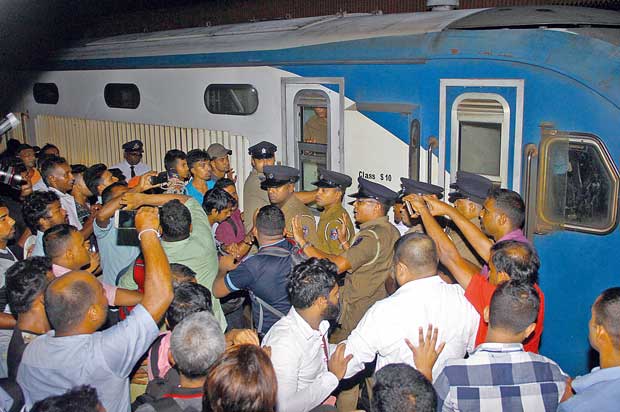Reply To:
Name - Reply Comment
Last Updated : 2024-04-19 10:56:00

A strike is considered successful if maximum number of patients suffered...
Commuters took engine drivers to task not because they were against the strikers’ demands, but they were high and dry due to the strike at an hour when the bus services were also fast sagging.
Who can contest these demands? At the same time who can justify their intended blockade of Colombo as a mode of struggle?
Newspapers carried a picture of several Policemen risking their lives in saving a locomotive engine driver of the Sri Lanka Railways at the Fort Railway Station during a surprise strike on October 11 by the railway employees.
The engine driver had been manhandled by the furious rail commuters, who had been stranded on their way home in the evening by the surprise work stoppage. The commotion lasted for several hours and the strike had to be called off next morning.
 The incident gained significance as one contrasting to another incident where a high ranking Police officer had been caught on camera days ago while slapping a person demonstrating in Hambantota against the proposed leasing out of Mattala airport to a foreign firm.
The incident gained significance as one contrasting to another incident where a high ranking Police officer had been caught on camera days ago while slapping a person demonstrating in Hambantota against the proposed leasing out of Mattala airport to a foreign firm.
Apart from that it is a noteworthy picture as it apparently generalises the current attitude of the ordinary people towards the so-called “struggles” by various groups that inconvenience them.
The commuters took the locomotive engine drivers to task not because they were against the strikers’ demands, but they were high and dry due to the strike at an hour when the bus services were also fast sagging.
A few months ago a group of people created a similar din at a Government hospital in the North-western Province protesting against the Government doctors striking against the South Asian Institute of Technology and Medicine (SAITM). Again several incidents were reported from the streets in Colombo recently where ordinary people had resorted to challenge the demonstrators who had blocked the roads creating traffic snarls.
When the army barged into the Kolonnawa oil terminal of the Ceylon Petroleum Corporation (CPC) in August to crack down on an indefinite strike by the CPC employees, people in the country, except for those craving to overthrow the government, were happy.
Also people were unmoved when thugs apparently mobilised by the politicians of the area attacked the striking CPC workers after the army’s takeover of the Kolonnawa oil facility.
No media criticised the high-handed measures taken by the Government or the individual politicians, since the mood of the common man was against the strike.
Is the attitude of the ordinary people towards the “struggles” trending? It is quite possible, given the number of demonstrations and strikes witnessed in recent years, on a daily basis.
The irony of these struggles is that they must exert maximum pressure on the hapless ordinary people who are not in any way responsible for their problems so that the authorities would feel heat
However, the general public was not against the rights of those demonstrating on roads or launching strikes. In many occasions they do not know what the doctors are striking work for or the students are demonstrating for.
It is their rights to move freely on roads, or to be treated at Government hospitals maintained with the taxes they pay they were concerned about. Given the fact that many issues have been politicised ordinary people are more confused about the demands of the demonstrators and the strikers.
For instance, it is public knowledge that it was the Mahinda Rajapaksa Government that provided all assistance including loans and scholarships to establish and maintain the SAITM.
When the doctors and the medical students, who meekly submitted during that Government wage an indefinite “war” now demanding the abolition of that private medical college, especially with the political backing of the same Rajapaksas, only a politically motivated person can justify that “struggle.”
Besides, Government media is cleverly exposing the hypocrisy of those against the SAITM including former Chairman of the Sri Lanka Medical Council (SLMC) Professor Carlo Fonseka by telecasting their speeches made during the Rajapaksa regime.
And irrespective of whether those struggles are justifiable or not, how long can the people tolerate the life threatening strikes by the doctors is the question remains.
Not a single day is being passed nowadays without a demonstration by some group obstructing the main roads in Colombo, especially at peak hours. The protesters must undeniably have the right to express their protest and demand what they deem as the solution to their problems. But why should others who do not know an iota of the problem, leave alone being responsible for it, suffer due to their struggles?
Janatha Vimukthi Peramuna (JVP) Parliamentarian Sunil Handunnetti had claimed recently that the people had to put up with the temporary hardships they faced in times of demonstrations and strikes, as those struggles involved the rights of those agitators and sometimes every citizen of the country.
True, this contention seems to be sound on moral grounds. However, going by the number of protests and demonstrations taking place in Colombo almost on a daily basis people might hesitate to agree with the idea. So many “temporary” difficult situations would accumulate into a permanent chaotic situation.
Tens of thousands of vehicles were trapped for more than four hours in an evening due to a sit-in-protest by Thotalanga squatters on the Japanese Friendship Bridge in March last year and many people, who were on their way to Katunayake airport to travel abroad had to reschedule their foreign trips.
Thousands of people including students, women and young girls returning home had to haplessly languish in packed vehicles for nearly four hours without knowing what they should do. Hundreds of patients travelling to hospitals for treatment and those returning from hospitals were also among those trapped.
One cannot deny the grievances of the squatters and their demand for redress. However, what was the right they had to take tens of thousands of people hostage in order to win their rights? In the same month the trade union leader of the JVP K.D. Lal Kantha had threatened the Government (in fact the people) on various platforms to besiege Colombo city by bringing in thousands of farmers to the city from all over the country and making them block the six main entry points to the city, unless the Government met the farmers’ demands.
The farmers had been demonstrating then in various parts of the country demanding the fertiliser subsidy that the Government promised during the Presidential Election and a proper mechanism to be set up for them to sell their paddy harvest at a reasonable price.
Who can contest these demands? At the same time who can justify their intended blockade of Colombo as a mode of struggle?
The irony of these struggles is that they must exert maximum pressure on the hapless ordinary people who are not in any way responsible for their problems so that the authorities would feel heat. A strike by the doctors is considered successful if maximum number of patients suffered and as many patients as possible die due to the strike. In respect of a Ceylon Electricity Board (CEB) employees’ strike maximum loss to the country’s economy and healthcare is expected. For the same reason peak hours are chosen for demonstrations, creating chaotic traffic jams.
This is not different from the LTTE’s intention when they were cornered into a small area in Mullivaikkal in April and May, 2009. They wanted maximum number of casualties among the civilians to put the blame on the Government troops and thereby invite foreign intervention. Therefore they attacked the armed forces from among the civilians.
Trade unions always expect the people’s support for their struggles. They distribute leaflets in public places such as the Fort railway station and display placards with their demands written on them for this purpose. Some Leftist political parties mobilise their trade unions to prove the workers that the bourgeois governments were not interested in solving problems of the workers and the “proletariat” in general and thereby persuade them for revolutionary regime change.
However, at the same time, they antagonise the ordinary people by their unreasonable modes of struggle. Hence, they cannot expect the wholehearted support for their struggles from the masses. It is high time for them to think afresh and find a way to strike a balance between the workers’ rights and the rights of other masses.

Add comment
Comments will be edited (grammar, spelling and slang) and authorized at the discretion of Daily Mirror online. The website also has the right not to publish selected comments.
Reply To:
Name - Reply Comment
On March 26, a couple arriving from Thailand was arrested with 88 live animal
According to villagers from Naula-Moragolla out of 105 families 80 can afford
Is the situation in Sri Lanka so grim that locals harbour hope that they coul
A recent post on social media revealed that three purple-faced langurs near t